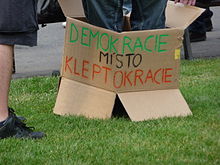Corrupt Legislation, painting by Elihu Vedder
Kleptocracy (from Greek κλέπτης kléptēs, "thief", κλέπτω kléptō, "I steal", and -κρατία -kratía from κράτος krátos,
"power, rule") is a government with corrupt leaders (kleptocrats) that
use their power to exploit the people and natural resources of their own
territory in order to extend their personal wealth and political
powers. Typically, this system involves embezzlement of funds at the expense of the wider population.
Kleptocracy is different from a plutocracy (society that is ruled or controlled by people of great wealth or income) and oligarchy
(a form of power structure in which power rests with a small number of
people distinguished by wealth, education, religious status etc.). A
kleptocracy is a government ruled by corrupt politicians who use their
political power to receive kickbacks, bribes,
and special favors at the expense of the populace, or simply direct
state resources to themselves, relatives or associates. Kleptocrats may
use political leverage to pass laws that enrich them or their
constituents and they usually circumvent the rule of law.
Characteristics
Kleptocracies are generally associated with dictatorships, oligarchies, military juntas, or other forms of autocratic and nepotist
governments in which external oversight is impossible or does not
exist. This lack of oversight can be caused or exacerbated by the
ability of the kleptocratic officials to control both the supply of
public funds and the means of disbursal for those funds.
Kleptocratic rulers often treat their country's treasury as a source of personal wealth, spending funds on luxury goods and extravagances as they see fit. Many kleptocratic rulers secretly transfer public funds into hidden personal numbered bank accounts in foreign countries to provide for themselves if removed from power.
Kleptocracy is most common in developing countries and collapsing nations whose economies are reliant on the trade of natural resources. Developing nations' reliance on export incomes constitute a form of economic rent
and are easier to siphon off without causing the income to decrease.
This leads to wealth accumulation for the elites and corruption may
serve a beneficial purpose by generating more wealth for the state.
In a collapsing nation, reliance on imports from foreign
countries becomes likely as the nation's internal resources become
exhausted, thereby contractually obligating themselves to trading
partners. This leads to kleptocracy as the elites make deals with
foreign adversaries to keep the status quo for as long as possible.
A specific case of kleptocracy is Raubwirtschaft, German
for "plunder economy" or "rapine economy", where the whole economy of
the state is based on robbery, looting and plundering the conquered
territories. Such states are either in continuous warfare with their
neighbours or they simply milk their subjects as long as they have any
taxable assets. Arnold Toynbee has claimed the Roman Empire was a Raubwirtschaft.
Financial system
Contemporary studies have identified 21st century kleptocracy as a global financial system based on money laundering (which the International Monetary Fund has estimated comprises 2-5 percent of the global economy). Kleptocrats engage in money laundering
to obscure the corrupt origins of their wealth and safeguard it from
domestic threats such as economic instability and predatory kleptocratic
rivals. They are then able to secure this wealth in assets and
investments within more stable jurisdictions,
where it can then be stored for personal use, returned to the country
of origin to support the kleptocrat's domestic activities, or deployed
elsewhere to protect and project the regime's interests overseas.
Illicit funds are typically transferred out of a kleptocracy into Western jurisdictions for money laundering and asset security. Since 2011, more than $1 trillion has left developing countries annually in illicit financial outflows. A 2016 study found that $12 trillion had been siphoned out of Russia, China, and developing economies. Western professional services providers
are an essential part of the kleptocratic financial system, exploiting
legal and financial loopholes in their own jurisdictions to facilitate
transnational money laundering. The kleptocratic financial system typically comprises four steps.
- First, kleptocrats or those operating on their behalf create anonymous shell companies to conceal the origins and ownership of the funds. Multiple interlocking networks of anonymous shell companies may be created and nominee directors appointed to further conceal the kleptocrat as the ultimate beneficial owner of the funds.
- Second, a kleptocrat's funds are transferred into the Western financial system via accounts which are subject to weak or nonexistent anti-money laundering procedures.
- Third, financial transactions conducted by the kleptocrat in a Western country complete the integration of the funds. Once a kleptocrat has purchased an asset this can then be resold, providing a legally defensible origin of the funds. Research has shown the purchase of luxury real estate to be a particularly favored method.
- Fourth, kleptocrats may use their laundered funds to engage in reputation laundering, hiring public relations firms to present a positive public image and lawyers to suppress journalistic scrutiny of their political connections and origins of their wealth.
The United States
is international kleptocrats' favoured jurisdiction for laundering
money. In a 2011 forensic study of grand corruption cases, the World Bank found the United States was the leading jurisdiction of incorporation for entities involved in money laundering schemes. The Department of Treasury estimates that $300 billion is laundered annually in the United States.
This kleptocratic financial system flourishes in the United States for three reasons.
- First, the absence of a beneficial ownership registry means that it is the easiest country in the world in which to conceal the ownership of a company. The United States produces more than 2 million corporate entities a year, and 10 times more shell companies than 41 other countries identified as tax havens combined. It currently takes more information to obtain a library card than to form a US company.
- Second, some of the professions most at risk of being exploited for money laundering by kleptocrats are not required to perform due diligence on prospective customers, including incorporation agents, lawyers, and realtors. A 2012 undercover study found that just 10 of 1,722 U.S. incorporation agents refused to create an anonymous company for a suspicious customer; a 2016 investigation found that just one of 13 prominent New York law firms refused to provide advice for a suspicious customer.
- Third, such anonymous companies can then freely engage in transactions without having to reveal their beneficial owner.
The vast majority of foreign transactions take place in US dollars.
Trillions of US dollars are traded on the foreign exchange market daily
making even large sums of laundered money a mere drop in the bucket.
Currently, there are only around 1,200 money laundering
convictions per year in the United States and money launderers face a
less than five percent chance of conviction. Raymond Baker estimates that law enforcement fails in 99.9% of cases to detect money laundering by kleptocrats and other financial criminals.
Other Western jurisdictions favoured by kleptocrats include the United Kingdom and its dependencies, especially the British Virgin Islands, the Cayman Islands, Guernsey and Jersey. Jurisdictions in the European Union which are particularly favoured by kleptocrats include Cyprus, the Netherlands, and its dependency the Dutch Antilles.
Bust of Ferdinand Marcos in Tuba, Philippines
Effects
The effects of a kleptocratic regime or government on a nation are typically adverse in regards to the welfare of the state's economy, political affairs, and civil rights.
Kleptocratic governance typically ruins prospects of foreign investment
and drastically weakens the domestic market and cross-border trade. As
kleptocracies often embezzle money from their citizens by misusing funds
derived from tax payments, or engage heavily in money laundering schemes, they tend to heavily degrade quality of life for citizens.
In addition, the money that kleptocrats steal is diverted from
funds earmarked for public amenities such as the building of hospitals,
schools, roads, parks – having further adverse effects on the quality of
life of citizens. The informal oligarchy that results from a kleptocratic elite subverts democracy (or any other political format).
Examples
According to the "Oxford English Dictionary", the first use in English occurs in the publication "Indicator" of 1819: “Titular ornaments, common to Spanish kleptocracy.”
According to at least one commentator, parasitism
may be the new social paradigm — involving class warfare and
exploitation of electoral processes — of myriad and disparate countries
around the world.
In early 2004, the German anti-corruption NGO Transparency International released a list of what it believed to be the ten most self-enriching leaders in the past two decades.
In order of amount allegedly stolen USD, they were:
- Former Indonesian President Suharto ($15 billion – $35 billion)
- Former Philippine President Ferdinand Marcos (at least $10 billion by 1986, equivalent to about $21.6 billion in 2014 dollars)
- Former Zairian President Mobutu Sese Seko ($5 billion)
- Former Prime Minister of Malaysia Najib Razak ($4.5 billion)
- Former Nigeria Head of State Sani Abacha ($2 billion – $5 billion)
- Former Yugoslav President Slobodan Milošević ($1 billion)
- Former Haitian President Jean-Claude Duvalier ("Baby Doc") ($300 million – $800 million)
- Former Peruvian President Alberto Fujimori ($600 million)
- Former Ukrainian Prime Minister Pavlo Lazarenko ($114 million – $200 million)
- Former Nicaraguan President Arnoldo Alemán ($100 million)
- Former Philippine President Joseph Estrada ($78 million – $80 million)
Donald Trump has been accused of tactics reminiscent of tin-pot kleptocracies by Paul Waldman while writing for the Washington Post.
The Russian president Vladimir Putin is alleged to be the "head of the clan", whose assets are estimated at over $200 billion.
A list of Russian and Ukrainian politicians associated with
"kleptocratic style" has been published by the Kleptocracy Archives
project.
In addition, other sources have listed former PLO Chairman Yasser Arafat as having stolen $1 billion to $10 billion; and Pakistani President Asif Ali Zardari to have received kickbacks on contracts and misappropriating public funds, siphoning over $2 billion to his Swiss accounts.
Former Sudanese President Omar al-Bashir
has been accused of siphoning off up to $9bn (£5.6bn; 7bn euros) of his
country's funds by the chief prosecutor of the International Criminal
Court (ICC). Luis
Moreno Ocampo told the BBC that President Bashir had hidden the money
in personal accounts outside Sudan. Mr Ocampo's suspicions originally
came to light when a diplomatic cable obtained by Wikileaks was
published by the Guardian newspaper. Sudan has forcefully denied the
claims. The ICC's chief prosecutor has charged Mr Bashir with crimes
against humanity, war crimes and genocide over alleged atrocities in
Sudan's Darfur region.
The former Chairman of BTA Bank Mukhtar Ablyasov is alleged to
have embezzled more than $6 billion from his bank committing the largest
financial fraud in history.
In May 2017, the Carnegie Endowment for International Peace released a report detailing what it called a kleptocratic network across the government and private sector in Honduras.
Nursultan Nazarbayev is a head of the Kazakhstan ruling clan with $7 billion assets.
China's former prime minister, Wen Jiabao, left office in 2013 with his close relatives controlling assets worth at least $2.7 billion. These revelations were censored in print and censored online in China.
Former Malaysian Prime Minister Najib Tun Abdul Razak had $731 million in his personal bank accounts when his ruling-party alliance Barisan Nasional lost the 14th election to opposition party Pakatan Harapan led by former Prime Minister Mahathir Mohamad, in part because of allegations of participating in the 1MDB scandal.
The term kleptocracy was also used to refer to the Russian economy, soon after the Soviet collapse
in 1991. The "democrats", led by Yegor Gaidar and Anatoly Chubais,
freed prices in 1992 and unleashed hyperinflation before they privatized
Russia's assets. Most Russian citizens lost their savings in only a few
weeks. A few billionaire "oligarchs" amassed fortunes not by creating
new enterprises, but by arbitraging the huge difference between old
domestic prices for Russian commodities and the prices prevailing on the
world market. Instead of investing in the Russian economy, they stashed
billions of dollars in Swiss bank accounts.
Experts estimate that as much as $15 billion left Russia each year as
either capital flight or laundered money from illegal transactions.
Referring to Russia, Daniel Kimmage also used the terms: "kerdocracy"
("rule based on the desire for material gain") or "khrematisamenocracy"
("rule by those who transact business for their own profit").
Other terms
Demonstration banner with text: "Demokracie místo kleptokracie" (Democracy instead of kleptocracy). Peace rally in Brno for Real Democracy NOW, Moravian Square, Brno, Czech Republic.
A narcokleptocracy is a society in which criminals involved in the trade of narcotics have undue influence in the governance of a state. For instance, the term was used to describe the regime of Manuel Noriega in Panama in a report prepared by a subcommittee of the United States Senate Committee on Foreign Relations chaired by Massachusetts Senator John Kerry. The term narcostate has the same meaning.





